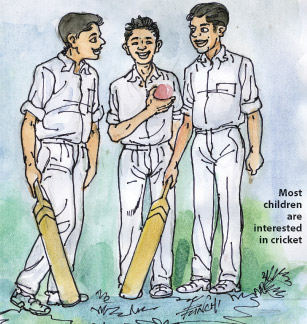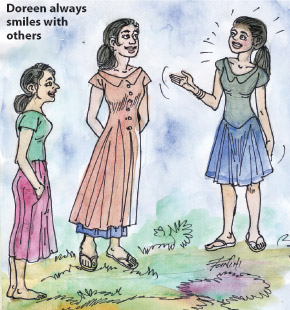|

by R. S. Karunaratne
Adverbs with the verb
 Some adverbs usually go with the verb. Some adverbs usually go with the verb.
Amanda always comes after 9.30 a.m.
Some people certainly like to live in Australia.
Small children often get ill.
We already know that you’ve passed the examination.
We hardly ever go to the gymnasium.
She has already read Oliver Twist.
It will probably rain in the evening.
I’ll certainly help you.
He always greets others in the morning.
Doreen always smiles with others.
She usually eats bread with jam.
The baby is still asleep.
In questions the adverb goes after the auxiliary verb.
Do you ever write letters to your friends?
Has Mary always lived in this house?
Do you often go to India?
Does she often play the piano?
Have you ever been to China?
Are you always in a happy mood?
Does he ever take a holiday?
Do you usually eat in hotels?
Is Corea still ill?
Interested
We use “interested” to say how people feel.
I am interested in philosophy.
Most children are interested in cricket.
Are you interested in politics?
Most women are interested in fashions.
Most girls are interested in music.
Bored
We use “bored” to say how people feel.
Some people are often bored at work.
Interesting / boring / exciting
 We use “interesting, boring” and “exciting” to describe the things or
people that cause the feeling. We use “interesting, boring” and “exciting” to describe the things or
people that cause the feeling.
Music lessons are always interesting.
I know that you’re doing a boring job.
Travelling around the world can be exciting.
Some words such as “fast, hard, late, early, daily, weekly” and
“monthly” are adjectives and adverbs.
I like to drive a fast car. (Adjective)
John drives fast. (Adverb)
I travel by an early train. (Adjective)
My sister returned home early. (Adverb)
He is well known for hard work. (Adjective)
People in the private sector work hard. (Adverb)
The train is late. (Adjective)
All the buses are running late today. (Adverb)
Hardly / lately
“Hardly” means “almost not.”
We hardly visit them.
“Lately” means “recently.”
I haven’t heard from him lately.
Some words such as “friendly, lonely, lovely” and “silly” are
adjectives, not adverbs.
Lorna gave me a friendly smile.
I am lonely.
Her face is lovely.
Don’t be silly.-/
Match words and meanings
Here’s an exciting way to enrich your vocabulary. Match the words in
column “A” with their meanings in column “B” and check your answers with
the key. The first has been done for you.
[Column A]
L 1. discretion
... 2. discriminate
... 3. discursive
... 4. discuss
... 5. disease
... 6. diseased
... 7. disembark
... 8. disenchanted
... 9. disenfranchise
.. 10. disengage
.. 11. disentangle
.. 12. disfavour
.. 13. disfigure
.. 14. disgrace
.. 15. disgraceful
.. 16. disgruntled
.. 17. disguise
.. 18. disgust
.. 19. dishearten
.. 20. dishevelled
.. 21. disinclination
.. 22. disinfect
.. 23. disinformation
.. 24. disingenuous
.. 25. disintegrate
[Column B]
A. involving discussion
B. illness caused by infection or failure of health
C. to leave a ship or aircraft after a journey
D. to separate things that have become joined
E. to give a new appearance to someone to hide their true form
F. to make a person to lose confidence
G. a strong feeling of disapproval
H. unhappy
I. to spoil the appearance of someone or something
J. to talk about a subject with someone
K. to take away the right to vote
L. the ability to behave without causing embarrassment
M. suffering from a disease
N. to become separated from something
O. embarrassment and the loss of other people’s respect
P. to become weaker by breaking into small pieces
Q. very bad
R. very untidy
S. to clean something using chemicals that kill bacteria
T. slightly dishonest
U. false information
V. a feeling of not wanting to do something
W. a feeling of dislike
X. no longer believing in the value of something
Y. to treat someone differently
Key:
2. Y 3. A 4. J 5. B 6. M 7. C 8. X 9. K 10. N 11. D 12. W 13. I 14. O
15. Q 16. H 17. E 18. G 19. F 20. R 21. V 22. S 23. U 24. T 25. P
Starters:
Adverbs and word order
Adverbs can be used in three places in a sentence. They are, front
position, mid position and end position.
 Front position Front position
Then the ship sank in the Indian ocean.
Outside it was raining heavily.
Slowly the frightened animal crawled out of the hole.
Every day father goes for a walk in the morning.
Usually Buddhists go to temple on Poya days.
Mid position
The foreign delegates are just leaving the country.
Amanda has always loved her sister.
We do not often go to the theatre.
You should never tell lies.
The money has definitely been stolen.
End position
The ship sailed away.
It's raining hard.
I had my breakfast quickly.
The children played cricket yesterday.
I like you very much.
Adverbs of manner
Adverbs of manner tell us how something happens.
The boy politely asked for permission to go home early.
He rudely asked me to leave the room.
The child ran home fast.
She slowly stepped out of the house.
The prisoner bravely faced the punishment.
Adverbs of place and time are usually used at the end of a sentence.
Is there a police station nearby?
We didn't have mobile phones then.
She wasn't well yesterday.
The working committee of the party met for the first time yesterday.
I'll find out who pasted this poster on my gate very soon.
Adverbs of frequency
Some people are always in a hurry to do things.
She has often thought of going abroad for higher education.
Most of us sometimes feel depressed.
Normally the Principal comes to school late.
We occasionally pay them a visit.
[Activity]
Put the words in the right order and check your answers with the key.
1. cleaned / every / day / is / my / house
...................................
2. always / she / has / known / my / secrets
...................................
3. afford / can't / I / a / laptop / new / certainly
...................................
4. Leela / cut / the / paper / carefully / to / kite / make / a
....................................
5. Nethmi / can / also / the / violin / play
....................................
Key:
1. My house is cleaned every day.
2. She has always known my secrets.
3. I certainly can't afford a new laptop.
4. Leela cut the paper carefully to make a kite.
5. Nethmi can also play the violin.
Quiz on idioms
An idiom is a special kind of phrase. It is a group of words which
have a different meaning when used together from the one it would have
if the meaning of each word were taken individually. Tick the meaning of
the following idioms and check your answers with the key.
1. If someone gets a raw deal ...
(a) they have been treated unfairly
(b) they have been treated fairly
(c) they have been neglected
2. If someone is at death's door ...
(a) they are likely to leave the country
(b) they are likely to live longer
(c) they are likely to die
3. If you deal a death blow to a situation ...
(a) you cause it to survive a crisis
(b) you cause it to come to an end
(c) you cause it to be handled properly
4. If someone is dicing with death ...
(a) they are taking life-threatening risks
(b) they face death valiantly
(c) they ignore death threats
5. If someone fights to the death ...
(a) they are not afraid of death
(b) they will fight until they are killed
(c) they will not give up easily
6. If someone's life is a living death ...
(a) they are ill and unlikely to recover
(b) they are in good health
(c) they will not die early
7. If a situation requires all hands on deck ...
(a) it requires everybody to unite
(b) it requires everybody to leave the ship
(c) it requires everybody to work hard
8. If someone hits the deck ...
(a) they die
(b) they fall to the ground
(c) they will survive a crisis
9. If the police give you the third degree ...
(a) they ask you a lot of questions in an aggressive manner
(b) they praise you for making a statement
(c) they give you a certificate
10. If you do a demolition job on someone ...
(a) you attack them very strongly
(b) you praise them profusely
(c) you ignore them
Key:
1. (a) 2. (c) 3. (b) 4. (a) 5. (c) 6. (a) 7. (c) 8. (b) 9. (a) 10.
(a) |

